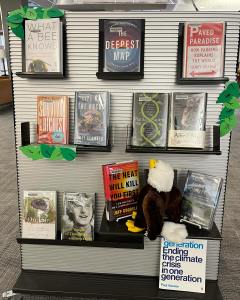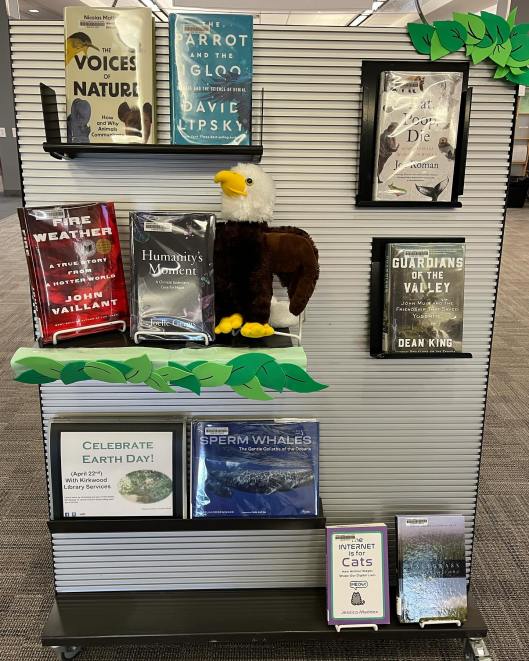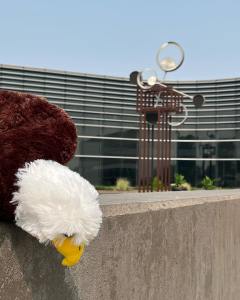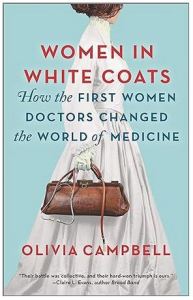We have a lot of history books here at the Kirkwood library. Here is a collection of ones about World War II. These titles are housed in Cedar Rapids, but you can request them to be delivered to any of the other centers at any time.
Find some interesting selections from previous years at 2020, 2021, 2022, Spring 2023, Fall 2023. Or search history in the search this blog or the particular type of history you’re looking for. Can’t find it that way? Reach out to our reference staff and if we can’t find it, we’ll be glad to help you find books in our collection, for us to buy, or for us to borrow from another library.
50 Years of Ms.: The Best of the Pathfinding Magazine that Ignited a Revolution, Edited by Katherine Spillar and the editors of Ms., Call Number: 305.42 S756f
Ancient Africa: A Global History to 300 CE by Christopher Ehret, Call Number: 960.1 E355a
 An American Family: The Shakurs and the Nation They Created by Santi Elijah Holley, Call Number: 322.42 H738a
An American Family: The Shakurs and the Nation They Created by Santi Elijah Holley, Call Number: 322.42 H738a
NOTE: “For over fifty years, the Shakurs have inspired generations of activists, scholars, and music fans. Many people are only familiar with Assata Shakur, the popular author and thinker, living for three decades in Cuban exile; or the late rapper Tupac. But the branches of the Shakur family tree extend widely, and the roots reach into the most furtive and hidden depths of the underground. Whether founding one of the most notorious Black Panther chapters in the country, spearheading community-based healthcare, or engaging in armed struggle with systemic oppression, the Shakurs were at the forefront. They have been celebrated, glorified, and mythologized. They have been hailed as heroes, liberators, and freedom fighters. They have been condemned, pursued, imprisoned, exiled, and killed. But the true and complete story of the Shakur family—one of the most famous names in contemporary Black American history—has never been told.”
Black Angels: The Untold Story of the Nurses Who Helped Cure Tuberculosis by Maria Smilios, Call Number: 610.73 S641b
NOTE: “During those dark pre-antibiotic days, when tuberculosis killed one in seven people, white nurses at Sea View, New York’s largest municipal hospital, began quitting. Desperate to avert a public health crisis, city officials summoned Black southern nurses, luring them with promises of good pay, a career, and an escape from the strictures of Jim Crow. But after arriving, they found themselves on an isolated hilltop in the remote borough of Staten Island, yet again confronting racism and consigned to a woefully understaffed facility, dubbed “the pest house” where “no one left alive.” Spanning the Great Depression and moving through World War II and beyond, this story follows the intrepid young women, the “Black Angels,” who, for twenty years, risked their lives working under dreadful conditions while caring for the city’s poorest—1,800 souls languishing in wards, waiting to die or become “guinea pigs” for experimental (often deadly) drugs. Yet despite their major role in desegregating the NYC hospital system—and regardless of their vital work in helping to find the cure for tuberculosis at Sea View—these nurses were completely erased from history. The Black Angels recovers the voices of these extraordinary women and puts them at the center of this riveting story celebrating their legacy and spirit of survival.”
Black Folk: The Roots of the Black Working Class by Blair LM Kelley, Call Number: 331.639 K293b
NOTE: Uses family history to help tell the story of a people. “Black Folk highlights the lives of the laundresses, Pullman porters, domestic maids, and postal workers who established the Black working class as a force in the late nineteenth and early twentieth centuries. Taking jobs white people didn’t want and confined to segregated neighborhoods, Black workers found community in intimate spaces, from stoops on city streets to the backyards of washerwomen, where multiple generations labored from dawn to dusk, talking and laughing in a space free of white supervision and largely beyond white knowledge. As millions of Black people left the violence of the American South for the promise of a better life in the North and West, these networks of resistance and joy sustained early arrivals and newcomers alike and laid the groundwork for organizing for better jobs, better pay, and equal rights.As her narrative moves from Georgia to Philadelphia, Florida to Chicago, Texas to Oakland, Kelley treats Black workers not just as laborers, or members of a class, or activists, but as people whose daily experiences mattered―to themselves, to their communities, and to a nation that denied that basic fact.”
Children of Ash and Elm: A History of the Vikings by Neil Price, Call Number: 948.022 P946c
 Christianity’s American Fate: How Religion Became More Conservative and Society More Secular by David A. Hollinger, Call Number: 277.3 H741c
Christianity’s American Fate: How Religion Became More Conservative and Society More Secular by David A. Hollinger, Call Number: 277.3 H741c
Curious History of the Heart: A Cultural and Scientific Journey by Vincent M. Figueredo, Call Number: 612.17 F475c
The Daughter of Auschwitz: My Story of Resilience, Survival, and Hope by Tova Friedman and Malcolm Brabant, Call Number: 940.531 F911d
NOTE: “Tova Friedman was one of the youngest people to emerge from Auschwitz. After surviving the liquidation of the Jewish ghetto in Central Poland where she lived as a toddler, Tova was four when she and her parents were sent to a Nazi labour camp, and almost six when she and her mother were forced into a packed cattle truck and sent to Auschwitz II, also known as the Birkenau extermination camp, while her father was transported to Dachau. During six months of incarceration in Birkenau, Tova witnessed atrocities that she could never forget, and experienced numerous escapes from death. She is one of a handful of Jews to have entered a gas chamber and lived to tell the tale. As Nazi killing squads roamed Birkenau before abandoning the camp in January 1945, Tova and her mother hid among corpses. After being liberated by the Russians they made their way back to their hometown in Poland. Eventually Tova’s father tracked them down and the family was reunited.”
Eight Days in May: The Final Collapse of the Third Reich by Volker Ullrich, Call Number: 943.086 U42e
Elite Capture: How the Powerful Took Over Identity Politics (And Everything Else) by Olufemi Taiwo, Call Number: 320.5 T218e
Empire of the Sum: The Rise and Reign of the Pocket Calculator by Keith Houston, Call Number: 510.284 H843e
Encyclopedia of Punk by Brain Cogan, Call Number: 781.66 C676e
A Fever in the Heartland: The Ku Klux Klan’s Plot to Take Over America, and the Woman Who Stopped Them by Timothy Egan, Call Number: 322.42 E287f
Hillbilly Highway: The Transappalachian Migration and the Making of a White Working Class by Max Fraser, Call Number: 975.69 F842h

Cover of “Empire of the Sum”
The Hispanic Republican: The Shaping of an American Political Identity, From Nixon to Trump by Geraldo Cadava, Call Number: 324.273 C121h
NOTE: “Cadava illuminates the history of the millions of Hispanic Republicans who, since the 1960s, have had a significant impact on national politics. Intertwining the little understood history of Hispanic Americans with a cultural study of how post–World War II Republican politicians actively courted the Hispanic vote during the Cold War (especially Cuban émigrés) and during periods of major strife in Central America (especially during Iran-Contra), Cadava offers insight into the complicated dynamic between Latino liberalism and conservatism, which, when studied together, shine a crucial light on a rapidly changing demographic that will impact American elections for years to come.”
Jews in the Garden: A Holocaust Survivor, the Fate of His Family, and the Secret History of Poland in World War II by Judy Rakowsky, Call Number: 940.531 R162j
Judgment at Tokyo: World War II on Trial and the Making of Modern Asia by Gary J. Bass, Call Number: 341.69 B317j
NOTE: “In the weeks after Japan finally surrendered to the Allies to end World War II, the world turned to the question of how to move on from years of carnage and destruction. For Harry Truman, Douglas MacArthur, Chiang Kai-shek, and their fellow victors, the question of justice seemed clear: Japan’s militaristic leaders needed to be tried and punished for the surprise attack at Pearl Harbor; shocking atrocities against civilians in China, the Philippines, and elsewhere; and rampant abuses of prisoners of war in notorious incidents such as the Bataan death march. For the Allied powers, the trial was an opportunity to render judgment on their vanquished foes, but also to create a legal framework to prosecute war crimes and prohibit the use of aggressive war, building a more peaceful world under international law and American hegemony. For the Japanese leaders on trial, it was their chance to argue that their war had been waged to liberate Asia from Western imperialism and that the court was victors’ justice.For more than two years, lawyers for both sides presented their cases before a panel of clashing judges from China, India, the Philippines, and Australia, as well as the United States and European powers. The testimony ran from horrific accounts of brutality and the secret plans to attack Pearl Harbor to the Japanese military’s threats to subvert the government if it sued for peace. Yet rather than clarity and unanimity, the trial brought complexity, dissents, and divisions that provoke international discord between China, Japan, and Korea to this day. Those courtroom tensions and contradictions could also be seen playing out across Asia as the trial unfolded in the crucial early years of the Cold War, from China’s descent into civil war to Japan’s successful postwar democratic elections to India’s independence and partition.”
Ledger Narratives: The Plains Indian Drawings of the Lansburgh Collection at Dartmouth College, Edited by Colin G. Calloway, Call Number: 741.089 H777L
The Lumumba Plot: The Secret History of the CIA and a Cold War Assassination by Stuart A. Reid, Call Number: 967.51 R358L
NOTE: “Within a year, everything would unravel. The CIA plot to murder Lumumba would fizzle out, but he would be deposed in a CIA-backed coup, transferred to enemy territory in a CIA-approved operation, and shot dead by Congolese assassins. Hammarskjöld, too, would die, in a mysterious plane crash en route to negotiate a cease-fire with the Congo’s rebellious southeast. And a young, ambitious military officer named Joseph Mobutu, who had once sworn fealty to Lumumba, would seize power with U.S. help and misrule the country for more than three decades. For the Congolese people, the events of 1960–61 represented the opening chapter of a long horror story. For the U.S. government, however, they provided a playbook for future interventions.”
Madame Restell: The Life, Death, and Resurrection of Old New York’s Most Fabulous, Fearless, and Infamous Abortionist by Jennifer Wright, Call Number: 362.198 W951m
NOTE: “Madame Restell is a sharp, witty Gilded Age medical history which introduces us to an iconic, yet tragically overlooked, feminist heroine: a glamorous women’s healthcare provider in Manhattan, known to the world as Madame Restell. A celebrity in her day with a flair for high fashion and public, petty beefs, Restell was a self-made woman and single mother who used her wit, her compassion, and her knowledge of family medicine to become one of the most in-demand medical workers in New York. Not only that, she used her vast resources to care for the most vulnerable women of the city: unmarried women in need of abortions, birth control, and other medical assistance. In defiance of increasing persecution from powerful men, Restell saved the lives of thousands of young women and, in fact, as author Jennifer Wright says in own words, “despite having no formal training and a near-constant steam of women knocking at her door, she never lost a patient.” Restell was a revolutionary who opened the door to the future of reproductive choice for women, and Wright brings Restell and her circle to life in this dazzling, sometimes dark, and thoroughly entertaining tale.The book also doubles as an eye-opening look into the “greatest American scam you’ve never heard about”: the campaign to curtail women’s power by restricting their access to healthcare. Before the 19th century, abortion and birth control were not only legal in the United States, but fairly common, and public healthcare needs (for women and men alike) were largely handled by midwives and female healers. However, after the Birth of the Clinic, newly-minted male MDs wanted to push women out of their space—by forcing women back into the home and turning medicine into a standardized, male-only practice. At the same time, a group of powerful, secular men—threatened by women’s burgeoning independence in other fields—persuaded the Christian leadership to declare abortion a sin, rewriting the meaning of “Christian morality” to protect their own interests. As Wright explains, “their campaign to do so was so insidious—and successful—that it remains largely unrecognized to this day, a century and a half later.” By unraveling the misogynistic and misleading lies that put women’s health in jeopardy, Wright simultaneously restores Restell to her rightful place in history and obliterates the faulty, fractured reasoning underlying the very foundation of what has since been dubbed the “pro-life” movement.”
Madman’s Will: John Randolph, 400 Slaves, and the Mirage of Freedom, by Gregory May, Call Number: 346.73
NOTE: “Few legal cases in American history are as riveting as the controversy surrounding the will of Virginia Senator John Randolph (1773–1833), which―almost inexplicably―freed all 383 of his slaves in one of the largest and most publicized manumissions in American history. So famous is the case that Ta-Nehisi Coates has used it to condemn Randolph’s cousin, Thomas Jefferson, for failing to free his own slaves. With this groundbreaking investigation, historian Gregory May now reveals a more surprising story, showing how madness and scandal shaped John Randolph’s wildly shifting attitudes toward his slaves―and how endemic prejudice in the North ultimately deprived the freedmen of the land Randolph had promised them. Sweeping from the legal spectacle of the contested will through the freedmen’s dramatic flight and horrific reception in Ohio, A Madman’s Will is an extraordinary saga about the alluring promise of freedom and its tragic limitations.”
Madness: Race and Insanity in a Jim Crow Asylum by Antonia A. Hylton, Call Number: 362.21 H996m
NOTE: ” Antonia Hylton tells the 93-year-old history of Crownsville Hospital, one of the last segregated asylums with surviving records and a campus that still stands to this day in Anne Arundel County, Maryland. She blends the intimate tales of patients and employees whose lives were shaped by Crownsville with a decade-worth of investigative research and archival documents. Madness chronicles the stories of Black families whose mental health suffered as they tried, and sometimes failed, to find safety and dignity. Hylton also grapples with her own family’s experiences with mental illness, and the secrecy and shame that it reproduced for generations. As Crownsville Hospital grew from an antebellum-style work camp to a tiny city sitting on 1,500 acres, the institution became a microcosm of America’s evolving battles over slavery, racial integration, and civil rights. During its peak years, the hospital’s wards were overflowing with almost 2,700 patients. By the end of the 20th-century, the asylum faded from view as prisons and jails became America’s new focus.”
On Savage Shores: How Indigenous Americans Discovered Europe by Caroline Dodds Pennock, Call Number: 970.004 D642o
Original Sin: Power, Technology and War in Outer Space by Bleddyn E. Bowen, Call Number 358.8 B786o
NOTE: “Space technology was developed to enhance the killing power of the state. The Moon landings and the launch of the Space Shuttle were mere sideshows, drawing public attention away from the real goal: military and economic control of space as a source of power on Earth.”
 Paved Paradise: How Parking Explains the World by Henry Grabar, Call Number: 388.474 G727p
Paved Paradise: How Parking Explains the World by Henry Grabar, Call Number: 388.474 G727p
Philip and Alexander: Kings and Conquerors by Adrian Goldsworthy, Call Number: 938.07 G622p
Pockets: An Intimate History of How We Keep Things Close by Hannah Carlson, Call Number: 391.009 C284p
Proving Ground: The Untold Story of the Six Women Who Programmed the World’s First Modern Computer by Kathy Kleinman, Call Number: 004.092 K639p
Punished for Dreaming: How School Reform Harms Black Children and How We Heal by Bettina L. Love, Call Number: 371.829 L897p
NOTE: “Dr. Love serves up a blistering account of four decades of educational reform through the lens of the people who lived it. Punished for Dreaming lays bare the devastating effect on 25 Black Americans caught in the intersection of economic gain and racist ideology. Then, with input from leading U.S. economists, Dr. Love offers a road map for repair, arguing for reparations with transformation for all children at its core.”
Rise and Fall of Third Reich: A History of Nazi Germany by William L. Shirer, Call Number: 943.086 S558r
On Savage Shores: How Indigenous Americans Discovered Europe by Caroline Dodds Pennock, Call Number: 970.004 D642o
Seeing Red: Indigenous Land, American Expansion, and the Political Economy of Plunder in North America by Michael John Witgen, Call Number: 305.897 W821s
NOTE: “Against long odds, the Anishinaabeg resisted removal, retaining thousands of acres of their homeland in what is now Michigan, Wisconsin, and Minnesota. Their success rested partly on their roles as sellers of natural resources and buyers of trade goods, which made them key players in the political economy of plunder that drove white settlement and U.S. development in the Old Northwest. But, as Michael Witgen demonstrates, the credit for Native persistence rested with the Anishinaabeg themselves. Outnumbering white settlers well into the nineteenth century, they leveraged their political savvy to advance a dual citizenship that enabled mixed-race tribal members to lay claim to a place in U.S. civil society. Telling the stories of mixed-race traders and missionaries, tribal leaders and territorial governors, Witgen challenges our assumptions about the inevitability of U.S. expansion.”
 Still Life With Bones: Genocide, Forensics, and What Remains by Alexa Hagerty, Call Number: 599.9 H144s
Still Life With Bones: Genocide, Forensics, and What Remains by Alexa Hagerty, Call Number: 599.9 H144s
NOTE: “Throughout Guatemala’s thirty-six-year armed conflict, state forces killed more than two hundred thousand people. Argentina’s military dictatorship disappeared up to thirty thousand people. In the wake of genocidal violence, families of the missing searched for the truth. Young scientists joined their fight against impunity. Gathering evidence in the face of intimidation and death threats, they pioneered the field of forensic exhumation for human rights. ”
Wager: A Tale of Shipwreck, Mutiny, and Murder by David Grann, Call Number: 910.916 G759w
NOTE: “On January 28, 1742, a ramshackle vessel of patched-together wood and cloth washed up on the coast of Brazil. Inside were thirty emaciated men, barely alive, and they had an extraordinary tale to tell. They were survivors of His Majesty’s Ship the Wager, a British vessel that had left England in 1740 on a secret mission during an imperial war with Spain. While the Wager had been chasing a Spanish treasure-filled galleon known as “the prize of all the oceans,” it had wrecked on a desolate island off the coast of Patagonia. The men, after being marooned for months and facing starvation, built the flimsy craft and sailed for more than a hundred days, traversing nearly 3,000 miles of storm-wracked seas. They were greeted as heroes. But then…six months later, another, even more decrepit craft landed on the coast of Chile. This boat contained just three castaways, and they told a very different story. The thirty sailors who landed in Brazil were not heroes—they were mutineers. The first group responded with countercharges of their own, of a tyrannical and murderous senior officer and his henchmen. It became clear that while stranded on the island the crew had fallen into anarchy, with warring factions fighting for dominion over the barren wilderness. As accusations of treachery and murder flew, the Admiralty convened a court martial to determine who was telling the truth. The stakes were life-and-death—for whomever the court found guilty could hang.”
 Wild Girls: How the Outdoors Shaped the Women Who Challenged a Nation by Tiya Miles, Call Number: 304.208 M643w
Wild Girls: How the Outdoors Shaped the Women Who Challenged a Nation by Tiya Miles, Call Number: 304.208 M643w
NOTE: “Harriet Tubman, forced to labor outdoors on a Maryland plantation, learned from the land a terrain for escape. Louisa May Alcott ran wild, eluding gendered expectations in New England. The Indigenous women’s basketball team from Fort Shaw, Montana, recaptured a sense of pride in physical prowess as they trounced the white teams of the 1904 World’s Fair. Celebrating women like these who acted on their confidence outdoors, Wild Girls brings new context to misunderstood icons like Sacagawea and Pocahontas, and to underappreciated figures like Native American activist writer Zitkála-Šá, farmworkers’ champion Dolores Huerta, and labor and Civil Rights organizer Grace Lee Boggs. This work of history puts girls of all races—and the landscapes they loved—at center stage and reveals the impact of the outdoors on women’s independence, resourcefulness, and vision. For these trailblazing women of the nineteenth and early twentieth centuries, navigating the woods, following the stars, playing sports, and taking to the streets in peaceful protest were not only joyful pursuits, but also techniques to resist assimilation, racism, and sexism.”
Winner Sells All: Amazon, Walmart, and the Battle for Our Wallets By Jason Del Rey, Call Number: 381.1 D364w
NOTE: “For years, Walmart and Amazon operated in separate spheres—one a massive brick-and-mortar retailer, the other an online giant. But in 2016, Walmart aggressively moved into the world of e-commerce, while Amazon made big bets in physical retail. The resulting rivalry is a bare-knuckle power struggle as each titan tries to outmaneuver the other to become the biggest omnichannel retailer in the world. As the two megacorporations have consolidated power, troubling consequences have also emerged—for consumers and small merchants faced with fewer buying and selling options, and for millions of workers paid meager wages for demanding and sometimes dangerous work.”
Women in White Coats: How the First Women Doctors Changed the World of Medicine by Olivia Campbell, Call Number: 610.922 C189w
The Wounded World: W.E.B. Du Bois and the First World War by Chad L. Williams, Call Number: 940.308 D815w
NOTE: “When W. E. B. Du Bois, believing in the possibility of full citizenship and democratic change, encouraged African Americans to “close ranks” and support the Allied cause in World War I, he made a decision that would haunt him for the rest of his life. Seeking both intellectual clarity and personal atonement, for more than two decades Du Bois attempted to write the definitive history of Black participation in World War I. His book, however, remained unfinished. In The Wounded World, Chad Williams offers the dramatic account of Du Bois’s failed efforts to complete what would have been one of his most significant works. The surprising story of this unpublished book offers new insight into Du Bois’s struggles to reckon with both the history and the troubling memory of the war, along with the broader meanings of race and democracy for Black people in the twentieth century.”
Sarah Uthoff is a reference library at Kirkwood Community College. LIKE the Kirkwood Community College Library on Facebook and find links to Sarah all over the web at her About Me Profile.




























